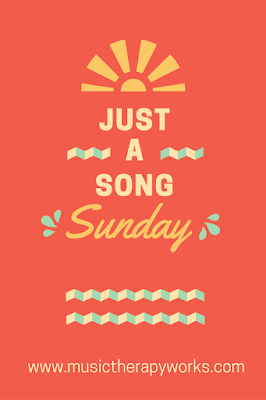Just a Song Sunday: Getting Deeper Into the Music
 I am always thinking about how to use music as a therapeutic medium with my clients, especially when I am in transition and trying to figure out how to make things work differently in my music therapy life. As a result, I write things that are always works in progress as I try to write my thoughts out in a way that makes sense to me. This recent Just a Song Sunday series is the result of just such a process.
I am always thinking about how to use music as a therapeutic medium with my clients, especially when I am in transition and trying to figure out how to make things work differently in my music therapy life. As a result, I write things that are always works in progress as I try to write my thoughts out in a way that makes sense to me. This recent Just a Song Sunday series is the result of just such a process. For a long time now, I've been interested in how music therapists do their jobs. I want to know what music therapists do in their day-to-day jobs - more how and why they make the clinical decisions they do than anything else. I want to know what is different from the work practices of a music therapist working with preschool aged clients with a variety of diagnoses and another music therapist who works with the same population group. I also always want to know what is different between a therapist who works with one population and someone who works with a different population. My dream research project is to have six music therapists run the exact same session plan with the exact same clients and then analyze the differences between the sessions looking deeply at choices made by the therapists during the sessions themselves.
I am more interested in how we use any particular song than I am in the song itself. I propose that I would use a specific song differently than the next music therapist (this is usually held up by my experiences with interns - we do things differently) and that both ways of using that specific song are equally therapeutic but may lead to different outcomes. That's pretty obvious, isn't it? I may sing a song in the key of E with a tessitura of middle C# to C#'. The next therapist may sing the same song in the key of D with a tessitura of B below middle C to B'. We might use the same tempi, the same meter, rhythms, melodic contour, harmonic structures, and all the other elements of music.
Does the difference in pitch lead to different outcomes for the client? I suspect that the answer might be "yes" but it is difficult to remove all of the other variables from the situation. Since music is time-ordered, you cannot run both experiences with the same client simultaneously, so there are different variables - time, attention, environment, amount of sleep, level of hunger, emotion, physiology, and many more - these could change how a client responds at any particular time.
 Ever since graduate school, I have made a particular point of getting into my musical presentation choices. I think about the music that I am going to use with my clients before I bring it into a session, and I think about what types of things I can to do to the music to make it work with my particular clients. I try to make purposeful decisions about how I present the music I choose to my clients. I also am able to make decisions about how to support my clients' musicking to come up with desirable clinical outcomes.
Ever since graduate school, I have made a particular point of getting into my musical presentation choices. I think about the music that I am going to use with my clients before I bring it into a session, and I think about what types of things I can to do to the music to make it work with my particular clients. I try to make purposeful decisions about how I present the music I choose to my clients. I also am able to make decisions about how to support my clients' musicking to come up with desirable clinical outcomes. By doing this, I feel that I am going deeper into the music that is my tool and my shared experience with my clients. It makes my music so much more than just a song.
By doing this, I feel that I am going deeper into the music that is my tool and my shared experience with my clients. It makes my music so much more than just a song.
If you are interested in more about the whys that lead me to do this, or if you want to know more about how I do these charts, feel free to contact me through the comments below!
Also, if you have a different philosophical outlook, please feel free to comment. I want to know and firmly believe that we can have a productive, professional discussion about this!

Comments
Post a Comment